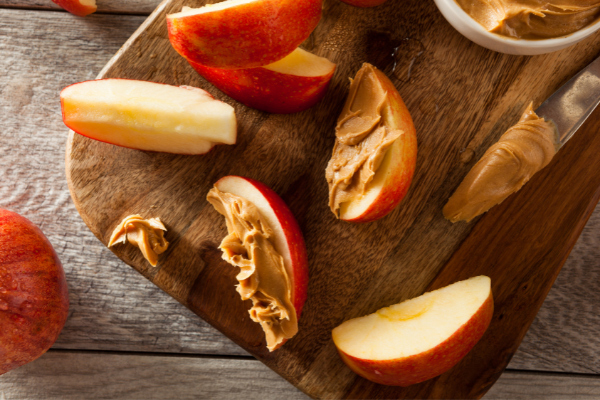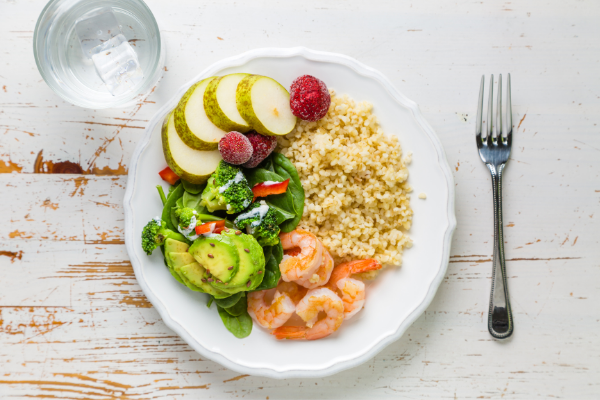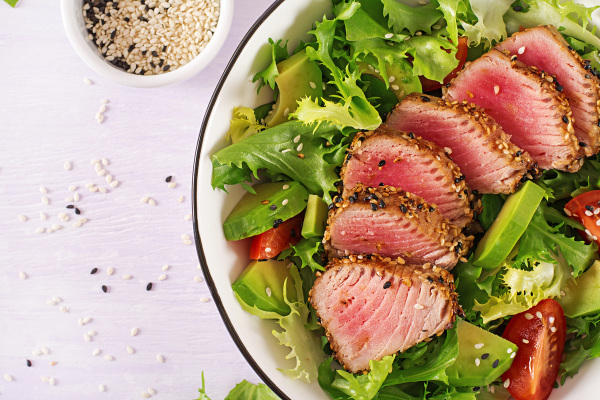Hangry: The Psychology of Food

Hangry. There’s your food and mood in one word. But how does it actually work? How does a food that we eat (or don’t eat) travel in our bodies to control our brains to tell us we can’t focus on an email or that we’re getting annoyed? With the COVID-19 pandemic highlighting the importance of our mental health, it’s time to start being more real with ourselves, and that kind of honesty all starts with communication.
Our body communicates through signaling molecules that are like the postal workers of the body. Two main types of these chemical messengers are hormones (produced by endocrine glands like your thyroid and travel in the bloodstream) and neurotransmitters (produced by and travel in between the neurons of our nervous systems). Hormones and neurotransmitters are both directly affected by the food we eat and affect the food we reach for as well. There are three ways that show this power of food: through how neurotransmitters are made, our blood sugar, and inflammation.

Neurotransmitters
Ever heard of dopamine? What about serotonin and norepinephrine? These all affect our appetite, mood, and concentration:
- Serotonin: helps regulate mood, sleep patterns, sexuality, anxiety, appetite and pain
- Dopamine: plays role in our reward system (feeling pleasure, learning, etc.), also helps with focus, concentration, memory, sleep, mood and motivation
- Norepinephrine: increases blood pressure and heart rate, affects alertness, arousal, decision-making, attention and focus
And guess what? They all need nutrients to even be produced. For example, the basic building blocks of our snacks and meals (think carbohydrates, proteins, and fats) get broken down and put into our bloodstream to travel to the cells that we need them to go to. So, a food with protein gets broken down into amino acids, one of which is tryptophan. Certain levels of tryptophan get readily absorbed into the brain and with the help of other nutrients such as vitamin B6, B12, and folic acid, it gets converted and made into serotonin, the “happy” neurotransmitter. Our mood improves, our craving for carbohydrates dissipates, and we smell the sunshine and roses in our lives.
Dopamine and norepinephrine also have their own foods and nutrients that affect how much of them we have and therefore, how we function as a person (table below). It’s a big list, so if you need help with translating that into a meal, sign up for a cooking class such as our virtual Tuna Nicoise class on Friday, April 15th or our Spring Brunch demo on Sunday, April 24th or our chefs can work with you one-on-one in a private virtual lesson as well. Okay, back to science: another emotion that food controls? Hanger.
|
Nutrients Needed |
Foods that increase nutrients needed |
|
|
Serotonin |
Tryptophan, vitamin B6, vitamin B12, folic acid, vitamin C, iron, zinc |
Fruits, vegetables (particularly dark leafy greens), beans, nuts, oats, dried dates, milk, yogurt, red meat, eggs, fish, seafood, poultry, sesame, chickpeas, seeds, bananas, chocolate |
|
Dopamine |
Phenylalanine, tyrosine, vitamin B12, folic acid, vitamin B6, vitamin C |
Fruits, vegetables, beans, nuts, soy, beef, poultry, pork, fish, milk, yogurt, eggs, cheese, certain nuts and seeds |
|
Norepinephrine |
Blood Sugar
Hangry actually reflects when our blood sugar is low (aka when we’re hungry). Every time we eat, our blood sugar goes up, triggering the release of insulin (a hormone) or the key that puts away the “sugar” into cells and out of our bloodstream. As this happens (say around a few hours after your breakfast), your blood sugar decreases and once it gets low enough, it triggers the release of an opposite hormone, glucagon, and others such as cortisol that affect our mood by triggering stress, anxiety, and hunger.
When we eat simple sugars (think ice cream, doughnuts, etc.) our blood sugar goes up and down very rapidly while if we eat complex sugars (think whole grains, beans, vegetables that have extra fiber, protein, etc.), our blood sugar changes much more gradually. This means less severe stress, hunger, and irritability and, over time, less resistance to the amount of insulin we need, which protects us from later development of things such as prediabetes or diabetes. Food, and more importantly certain kinds of food, equal less hangry time.

Inflammation
While some inflammation in certain situations is natural and beneficial (think when you get a cut on a finger), chronic inflammation can be harmful and associated with heart disease, diabetes, arthritis, cancer, and bowel diseases as well as being connected to our mood through mental conditions such as depression and anxiety. Depressive states stimulate a preference for foods high in sugar, fat, and/or salt, which act as a double-whammy since typically these are foods that also cause chronic inflammation and nudge out other foods that have more nutrients such as B vitamins, zinc, folate, and magnesium (which are brain-essential nutrients and are associated with non-depressive states).
Another nutrient from food that helps fight inflammation? The mighty omega-3’s. Omega-3’s are fatty acids that are anti-inflammatory and are essential for healthy nervous systems since they form part of our neuronal cell’s membranes, influence gene expression, and regulate our neurons when they want to fire off information. They also act as an antioxidant, which fights off free radical or “bad” molecules in our body from exposure to cigarette smoke or air pollutants for example. Antioxidants are important for our mood and mental health and are also found in fruits, vegetables, and whole grains.

Bottom Line
Food is pretty incredible. While there is much more complexity happening inside and outside our bodies that affect us than what this post talks about, knowing what we eat can support us and our mental health is the first step in taking control of how we feel. Including finishing reading this tome of a post to avoid getting hangry.

